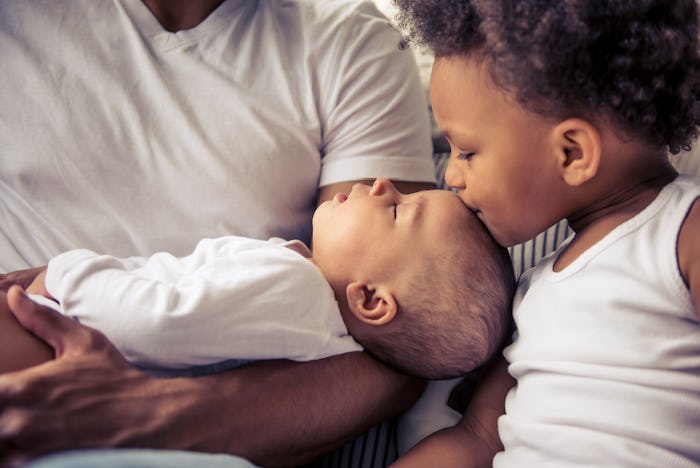Life

7 Baby Sleep Red Flags That Could Spell Trouble
Whenever anyone talks about sleepless nights with newborns, I immediately start singing the lyrics to Beastie Boys, "No Sleep Till Brooklyn." There is literally no sleep with a newborn, and even if you figuratively get to Brooklyn, there still isn't any sleep. The reality of having a sleepless baby is no sing-a-long. Babies are often called the young and the restless, for a reason, but what if it's more than that? What if your baby is struggling with a sleep disorder? Thankfully, there are baby sleep red flags that will help alert you to any possible problems.
According to a 2012 study published in the journal of the American Academy of Pediatrics, one in 10 infants and toddlers have problems sleeping at night. Researchers in the study concluded that it's a problem many parents and healthcare professionals seem to be overlooking, which is alarming considering the ramifications of inadequate sleep on a person's overall health. If these pediatric sleep issues are left untreated and uncorrected in children, experts suggested that it could lead to further problems in childhood and adulthood.
The encouraging part about infant and toddler sleep disorders is that they can be corrected early on, and usually with ease. Here are seven signs to watch out for if you suspect your baby is struggling with a sleep disorder.
1Your Baby Snores Loudly And A Lot
A baby that snores frequently and loud may have sleep apnea, a disorder where breathing is interrupted over and over again during sleep, according to Baby Center. As explained in the article, there are three types of sleep apnea and if left untreated, all three could lead to serious issues like slow heart rate and poor growth. If your baby is snoring, it's recommended that you bring it to your pediatrician's attention.
2Your Baby Wakes Up Frequently (And Isn't Hungry)
Babies typically wake up nightly for several months as infants and as toddlers for feedings; this is normal. It is generally not OK for a baby or toddler to wake up, sit up, and talk in the middle of their naps or night time sleep, according to the Baby Sleep Advice website. If this is happening consistently, you may want to look into why it's occurring as it could be a red flag that your baby is struggling with a sleep disorder.
3Your Baby Has Night Terrors
Night terrors are no fun for all involved. According to Baby Center, night terrors are a type of sleep disturbance and precautions should be taken when dealing with this issue. No one knows exactly why night terrors occur, but if you witness your baby or toddler thrashing, crying, screaming, moaning, with their eyes open (but not actually awake), they may be having one. As explained on the same site, night terrors are different than nightmares in that the child will not remember it, and may not even fully wake up.
Regardless, if your baby has night terrors, you'll want to move objects away from them at night to minimize possible injury. Because no one knows exactly what causes night terrors, there aren't really any treatments. It's still advised that if your baby is having what you perceive as night terrors, that you discuss it with their pediatrician.
4Your Baby Has Restless Movements During Sleep
If your child exhibits a lot of restless sleep, which includes: frequent rolling, kicking, jerking, moving an arm, or other body parts that causes them to wake up, it may be red flag of a serious sleep disorder. According to the Sleep Disorder Help website, Pediatric Limb Movement Disorder (PLMD) is characterized by
restless sleep, difficulty falling asleep, and in some cases a resistance to sleep.
Most notably, if your child has periodic (every 20 to 40 seconds) and sustained (0.5 to 4 seconds in duration) contractions of one or both front leg muscles that cause sleep interruptions, it's probably PLMD. As explained on the same site, PLMD is correlated to restless leg syndrome (RLS), and can be helped with various treatments and possibly even corrected.
5Your Baby Is Having Trouble Learning
Just like with adults, lack of quality sleep for babies can result in very fuzzy days. According to Web MD, your brain files away information that you learn and memorizes new skills for the next day. As explained in the aforementioned post, researchers found that those people who got adequate sleep had more active brains and therefore, had greater ease and less anxiety about learning new things.
If you notice that your baby isn't hitting milestones or seems to be lagging behind in several developmental areas, it may be worth taking a look at their sleep patterns and reporting it to their pediatrician.
6Your Baby Is Hard To Wake Up In The Morning
Again, same with adults, the more sleep we have the easier we are to rouse in the morning. As explained on the Baby Sleep Advice website referenced above, if your baby has a hard time waking up at normal times they may be having trouble sleeping.
7Your Baby Is Cranky (And Tired) During The Day
If your baby seems to be dragging during the day, or is often super fussy, it may be a sign of a sleeping disorder. As reported in the The New York Times, poor behavior is often overlooked when evaluating children for sleep disorders. Many parents and even doctors will just assume the child is "fussy," when in reality they may actually be extremely tired.
Having a baby with sleep issues may feel horrible, but ultimately the issues are manageable. Many can be corrected and even treated if needed, before becoming larger problems. All it takes is for parents to speak up about their child's sleep patterns, even if you don't think a doctor will perceive it as a bid deal. It's always worth bringing attention to, even if it is to ease your mind and put your worries to bed.